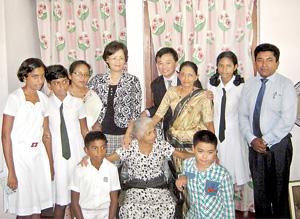

The Chinese boy with the family of Champa Amarasena (third from right) and other Chinese officials.
When her husband died in 2011, the Nagoda hospital staff asked Champa Amarasena if she would consent to donate her husband’s cornea. Mrs. Amarasena, a self-employed tailor from Katukurunda, Kalutara, still reeling from the shock of her husband’s death, said ‘yes’. ”To tell the truth, giving someone the ability to see is a weighty contribution,” she said, recalling her decision made three years ago. “I thought, someone would benefit from this, and it would be a great pina [good karmic merit] for my husband. I wasn’t against it one bit. And I didn’t expect anything in return either.”
Then, about three weeks ago, she received a phone call saying that a nine-year-old Chinese boy would like to meet the family of the donor whose eyes have restored his sight. Mrs. Amarasena was surprised at first, but said “no problem.” On September 12 (Friday), nine-year-old Xu Pengfei, his mother, their ophthalmologist Dr. Yao Shaolin, along with the wife of China’s Ambassador to Sri Lanka Ding Yue and an entourage of about 10 other people visited Kalutara. They were welcomed by Mrs. Amarasena, her four children (one doing A/Ls, one in Grade 9 and the twins in Grade 8), her mother-in-law and her husband’s sister.
When Pengfei walked in and greeted them, Mrs. Amarasena said her heart was filled with “utter joy,” and felt as if a part of her husband was still living. Her husband Saman’s death at 46 had been sudden and unexpected. He had been alone in the house when he had slipped, fallen, and hit his head. It had been too late by the time he was rushed to hospital. The doctors told the family he died from a ruptured blood vessel in his brain.
He was not an officially registered organ donor, Mrs. Amarasena said. However, when he was alive he had been heavily involved in danas and giving to the needy. He conducted almsgivings on the birthdays of his four children. During the drought seasons, he would arrange to send drinking water to areas like Polonnaruwa.
Saman’s mother was the one who took his death the hardest, Mrs. Amarasena said. The 82-year-old elder Mrs. Amarasena has been sickly and depressed since Saman’s death, but when she saw Pengfei she was “speechlessly overjoyed.” Pengfei had received the corneal donation when he was six. He had damaged his cornea while playing in school. He didn’t converse much with the adults, being only nine, but had instantly bonded with the four Amarasena children who gave him a present to take back home. Pengfei’s mother expressed her gratitude to the Amarasena family via a Sinhala-Chinese translator.
Their visit was made possible by Dr. Yao, the ophthalmologist, who came to Sri Lanka to perform a thousand, free-of-charge cataract surgeries in gratitude to the Sri Lanka Eye Donation Society, which donated a thousand corneas to China. Sri Lanka is in fact one of the largest eye donors in the world. Sri Lanka annually donates more corneas per capita than the United States, whose population is 15 times larger. This is made possible by the island’s “unique culture,” that emphasises Buddhist concepts of giving, said Janath Matara Arachchi, manager of the Eye Donation Society.
The Society annually receives about 4500 corneal donations. About 1,200 are used locally, as local patients are given priority. About 1,500 are shipped to 117 cities in 57 different countries. The corneas are sent free, but shipping and purchasing chemicals for preservation cost a significant amount of money, Mr. Matara Arachchi said. The Society doesn’t charge fees, but countries that receive eye donations reciprocate with financial donations, he said.
Throughout last week, Dr. Yao and his team of doctors restored eye sight to a thousand local patients facilitated by the Society. Bikkhuni Wellampitiya Dhammaseeli Meniyo, from Amadan Aranaya in Ranala, is one such patient who received cataract surgery free. At 75, she had vision trouble for a while. Soon after her surgery that would greatly restore her vision, she said “it was like the dawning of light when the Buddha preached his first sermon.” The bikkhuni, and many other patients, thanked the Society for the “great pina” of helping them get their vision back.
After the happy reunion, Mrs. Amarasena said her whole family – herself, the children, her mother, her husband’s sister—all have now signed up to donate their corneas also. ”We didn’t know much about this earlier,” she said. “And now we want to spread the news, to encourage other people to donate their eyes too,” she said.
From: The Sunday Times. http://www.sundaytimes.lk/140921/news/widow-fulfils-husbands-unspoken-wish-119000.html




